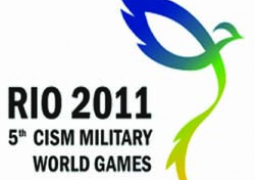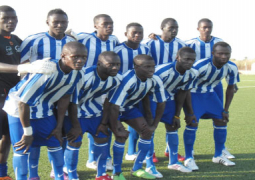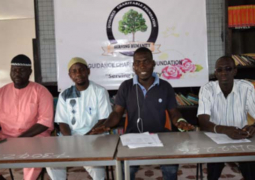
Defence
counsel Hawa Sisay-Sabally yesterday told the Banjul Magistrates’ Court that
the accused persons in the GNPC case are brains of the country.
She
made the statement, when she applied before Magistrate Omar Cham for the
accused persons to be remanded where they had been in custody, but not at the
remand wing of Mile 2 Prison.
When
the case was called, lawyer Ida Drammeh said she was representing the 1st, 4th,
and 6th accused persons. She was also together with lawyer Sissoho representing
the 6th accused person.
Lamin
S. Camara and A. Fatty represented the 2nd, 7th, and 9th accused persons, while
Lubna Farage represented the 8th accused person.
Hawa
Sisay-Sabally, Badou Conteh, Musa Batchilly and Yassin Senghore represented the
10th accused person.
Police
prosecutor ASP Manga represented the Inspector General of Police.
Magistrate
Cham told the court that the case was set for ruling on bail application for
the accused persons.
He
said he heard submissions from the prosecution and the defence, adding that
section 9 of the Economic Crime Specified Offences Act states that economic
crime cases are heard at the high court.
He
adduced that the prosecution argued that the court lacks jurisdiction to hear
the case, hence it could not entertain it.
Magistrate
Cham said the defence cited some authorities, referring to the constitution to
support their argument.
“I
shall follow the direction of section 9 of the Economic Crime Specified Offences
Act,” he told the court.
He
added that the court lacks jurisdiction to hear the case, and ordered the case
to be transferred to the high court.
He
said the accused should be remanded in custody.
Hawa
Sisay-Sabally asked the court to state where the accused should be remanded,
adding that she was applying for the accused to be remanded where they were
held in custody.
The
court should make an order, so that nobody would have the discretion to decide
where the accused should be remanded, counsel added.
Lawyer
Camara associated himself with the submission made by Hawa Sisay-Sabally.
At
this juncture, Ida Drammeh applied for the accused to have medical attention
given by their own doctors.
Magistrate
Cham said he would not make that order.
Ida
Drammeh then told the magistrate that she should be recorded, even if he was
going to refuse her application.
Magistrate
Cham asked her to see him in his chambers, but Ida Drammeh said she wanted to
make the application in an open court.
Prosecutor
Manga said he heard the submission made by the defence, adding that he was not
aware of any law that states that the accused should be remanded in any place
other than the prison.
He
stated that he respected the application made by the defence, but any security
facility other than the prison has no remand facility.
He
urged the court to overrule the application made by the defence, and order for
the accused to be remanded at Mile 2 Prison.
Hawa
Sisay-Sabally replied on points of law, and stated that whether at the NIA or
prison, the state has a remand place because, since the accused were arrested,
they had been remanded there, and the defence wanted the status quo to remain.
She
argued that the prosecutor did not give any reasons why the accused should be
kept in prison, and that the defence had not received any complaint from the
state that they could not keep the accused.
She
said the accused had spent all their lives in serving the country, citing
section 208 (a) of the CPC.
Magistrate
Cham then said he heard the submission made by Hawa Sisay-Sabally that the
accused be remanded at the NIA premises.
Ida
Drammeh then said she wished to make an application.
Magistrate
Cham asked her to come formally, and she said she would not with due respect,
and that she should be recorded.
She
added that the magistrate is a judicial officer who should listen to
applications, and make decisions on them.
Magistrate
Cham asked her to see him in chambers and she said she would not, and that she
would make her application in an open court.
The
magistrate then rose and walked into his chambers.
When
he returned to the courtroom, Ida Drammeh made two applications, that is, for
her clients to be allowed medical attention by their own medical doctors who
have their medical history; and, for the defence to be furnished with all the
documents relating to the matter in the charges, so they could prepare their
defence.
Prosecutor
Manga said he had no problem with the accused getting medical attention, but
could not guarantee that they would have their own medical doctors, adding that
the state would provide medical doctors to the accused.
He
added that with regard to the witness’ statements, the matter had been under
investigation, and the court had transferred the case to the high court.
The
defence could make an appropriate application at the high court, he continued.
Magistrate
Cham ruled that he has maintained his earlier decision that the court did not
have the jurisdiction to hear the case, and could not make an order for the
accused to be allowed to have their own doctors to attend to them.
He
said the needs of the accused would be taken care of by the authorities, adding
that where the accused should be remanded would be decided by the state.




